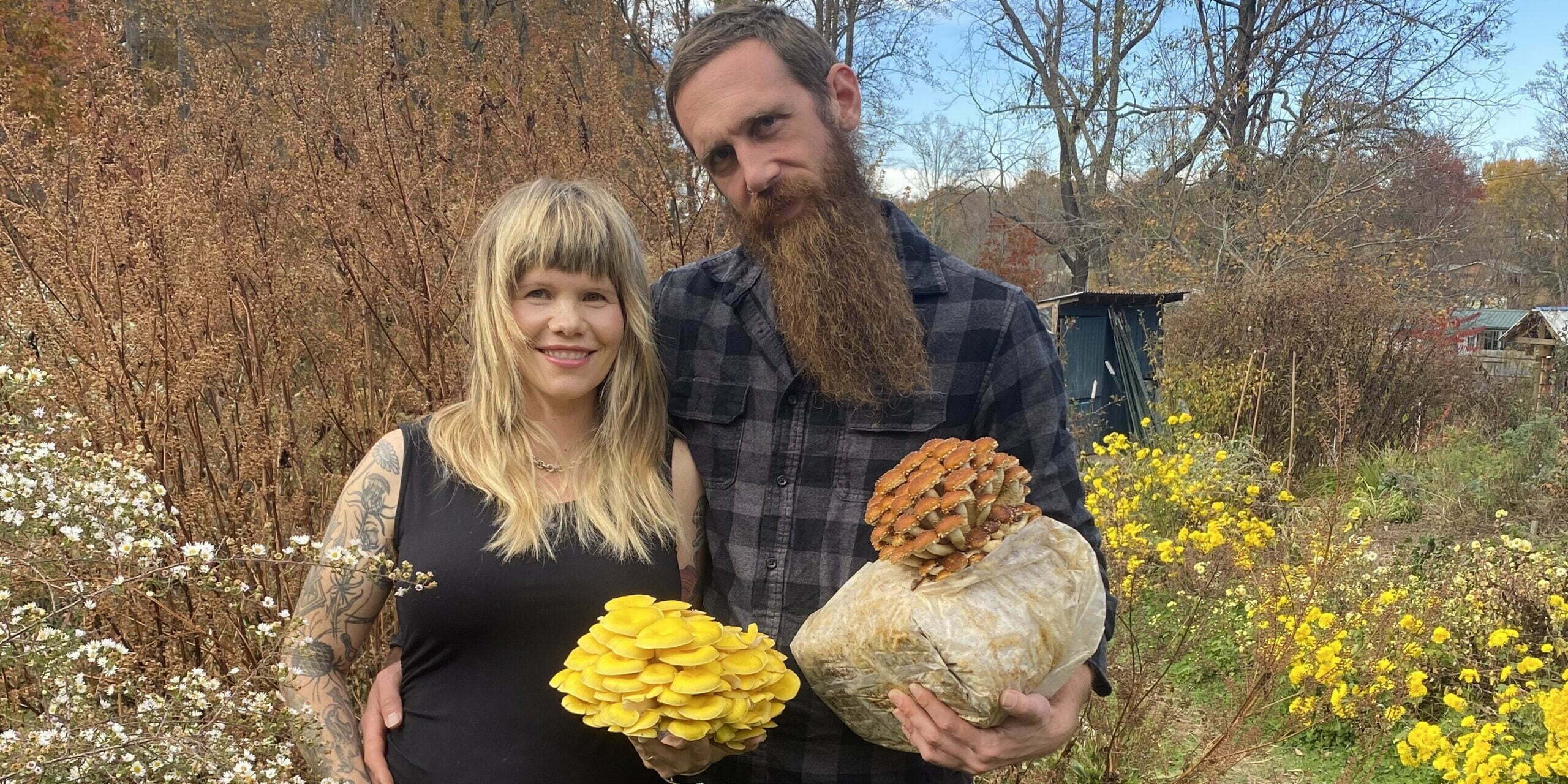Gwen Englebach will tell you that she and her farming partner and husband, Jay, are both shy. But talking to customers each week at farmers markets is a vital piece of their business, Black Trumpet Farm, which produces culinary and medicinal mushrooms in Leicester, North Carolina.
“Connecting with community is part of our mission, the social consciousness aspect of our farm,” says Gwen. “The problem with the current food system is a lack of relationship to food and where it comes from. It was important to us at the ground level to build those relationships. We’re spreading the word about mushrooms.”
That means patiently fielding questions like, “Are mushrooms safe to eat?” and “What is this?” as well as describing flavor and texture and building customer confidence with cooking tips. Most people are familiar with shiitake, but there are half a dozen other varieties they don’t know, like pink or golden oyster, pioppino, or lion’s mane.
“We’re going through all that with each person, a few minutes of conversation,” says Gwen. “People have been asking about nutritional content, and it’s more than I can say in one minute, so I’ve been bringing books with me to show people scientific research on why they might be helpful. Mushrooms can be a great alternative when people are trying to cut back on meat. Mushrooms have lots of umami flavor, which allows folks to use less salt. Mushrooms are also high in fiber.”
Take-home recipe cards are another way to gain mushroom-eating converts. Gwen points to their most popular recipe for lion’s mane crab cakes. Lion’s mane—which look a little like a furry head of cauliflower—are shredded and mixed with herbs, seasonings, egg, mayonnaise, and bread crumbs for a convincing vegetarian version of crab cakes. “It’s a good one for people who don’t think they like mushrooms,” says Gwen. Jay, in particular, is an avid home cook, and he’ll walk through basic cooking techniques to help customers avoid slimy mushrooms.
Farmers market access programs like ASAP’s Farm Fresh Produce Prescription and Double SNAP have helped bring in new customers who may not be as familiar with mushrooms. “We can get mushrooms to people in more of a sliding scale fashion and develop relationships,” says Gwen. “It’s hard work, but it’s worthwhile—especially when someone comes back to say how much they enjoyed eating mushrooms or that they feel better after changing their eating habits.”
Building the Business
Gwen and Jay didn’t set out to be mushroom growers, but couldn’t find suitable land for a conventional farm. They decided to figure out a niche that would allow them to make the most of sloped acreage and subpar soil. Gwen had been studying fungal ecology in a PhD program, so mushrooms seemed like a good fit.
At first they tried growing with outdoor logs, but the labor and materials cost was too high for the yield. It was also unpredictable—not conducive to a weekly market schedule. “Outdoor logs didn’t make sense to do as more than a side hustle,” admits Gwen. “It was important to us that we could make a living at this.”
Indoor cultivation was a newer concept, but one they realized could be more financially viable for them—even if there wasn’t a lot of information on how to set up systems. “It was hard to learn,” says Gwen. “There are some people teaching courses, but it’s mostly on YouTube.” Gwen and Jay worked off farm in 2017 and 2018 as they built infrastructure, and in 2019 went full time on the farm. In addition to farmers markets, they started selling to restaurants.
Most of Black Trumpet’s mushrooms are grown year-round, but they do swap some types seasonally. Pink and golden oysters do better in hotter weather, whereas king blue oysters and trumpets do better in cold. By rotating strains, they’re able to use less power, keeping the grow rooms at 58 degrees in the winter and 65 degrees in the summer.
Indoor cultivation does create sustainability tradeoffs with more power usage and plastic grow bags, notes Gwen. One way they work to offset this is by using sawdust recycled from local furniture factories as a substrate. They’re also planning to launch a compost business this year.
In 2022, after two years of construction, they completed a new 2,000-square-foot growing facility with more advanced HVAC and solar panels. They estimate their yield will double, or even triple, over the next several years. “We’re up to 1,000 pounds a week,” says Gwen. “It’s really a huge difference.” Plus, the new facility gives them the ability to grow new species, such as beech and maitake.
With the increase in production and new business on the horizon, they’ve hired several employees. Gwen and Jay—who had a baby in January—are moving into a phase where they can think beyond the farm’s day-to-day needs. For Gwen, that’s more outreach and education.
“It’s been five years of constant building things ourselves,” she says. “We made it through the pandemic, supply chain issues. I’m happy to see us in a place of more stability, but I’m ready to stop building infrastructure and start building the business.”

